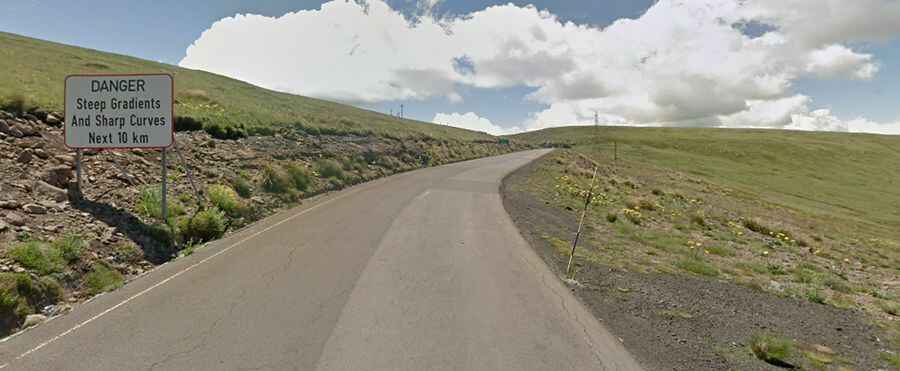Steep gradients and sharp curves to Mafika Lisiu Pass
Mafika Lisiu Pass is a high mountain pass at an elevation of 3.096m (10,157ft) above the sea level, located in the Leribè district of Lesotho. It’s one of the highest roads of the country,

Can you drive to Mafika Lisiu Pass?
Set high in the Maloti Range, on the northern part of the country, the road to the summit is totally paved. It’s called A25. The road is pretty challenging. It has steep climbs and descents, hairpin bends and waterfalls. Unless you’re adventurous and have a strongly developed sense of humour, some of the road signs along this pass aren’t likely to thrill you either. Signs warn of Sharp descent, Snow/ice and Falling rocks. Signs will also warn you of Steep curves for 5km. Just as you go into a Sharp descent another sign will helpfully tell you that Brake failure has killed. The slopes are steep and when it rains, rocks and stones get dislodged onto the road, carving craters in the edge of the tar as they land. It is advised not to travel on this pass in severe weather conditions.
How long is Mafika Lisiu Pass?
Built in the 1990’s, the pass is 176 km (109 miles) long running from Thaba-Tseka (the capital city of the Thaba-Tseka District) to Hlotse (a market town on the Hlotse River, near the South African border). The road tops out at 3.101m (10,173ft) by Mafika Lisiu Pass View Point, a natural vantage point west to the pass.
How long does it take to drive Mafika Lisiu Pass?
To drive the road without stopping will take most people between 4 and 5 hours. The drive is stunning and affords excellent viewing of the unique alpine flora. Every bend will have you wanting to stop the car to take in the view, to immortalize it in photographs. If you don’t have a head for heights, though, you may prefer to close your eyes and grit your teeth. The flora, bird life and photographic beauty of the area will astound, as will the winter snow, which has no equal in Southern Africa. Check the weather before the trip. Near the top of the pass is the Bokong Nature Reserve, the highest nature reserve in Africa accessible by car.